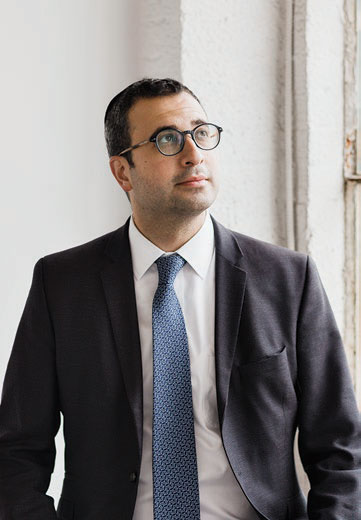To call Arieh Bloom’s enthusiasm for estate law unbridled is an understatement. “It’s commercial litigation on steroids!” he says, banging his palm on the glass-topped table. And taking a case to court? Don’t get him started. “I feel like I’m alive!”
Bloom is the co-founder of Tupman & Bloom LLP, a 17-month-old estate-litigation boutique. In that short period, the six-lawyer firm has gained a reputation for handling sizable, high-conflict disputes involving estates, trusts and powers of attorney. It’s work that can involve some intense shenanigans: secret families, dishonest advisors and dicey death-bed wills that suddenly disinherit half the children. As he describes his caseload, Bloom, an Orthodox Jew, bounces in his chair so forcefully that his kippah nearly falls off. “When people are fighting over a massive estate, where there’s more than enough money to go around, there might be a party who is a bit of a meshugenah, is nuts!” says the 32-year-old. “The level of dysfunction in certain cases is so high.”

“In estate litigation, there’s a huge emotional component that has been bubbling for decades,” says Arieh Bloom.
Bloom is particularly passionate about the art of cross-examination. During a trial, this is when he can confront a shady witness, like a power of attorney who has stolen money from a trust fund. “I like finding out who got their hand caught in the cookie jar,” he says. “When you get an admission that demonstrates the theory of the case, it’s awesome.”
Bloom didn’t exactly feel that fervour for his first career as a certified public accountant. In 2009, he completed a bachelor of commerce degree in accounting at McGill University. He swiftly landed a job at KPMG, where he represented high-net-worth individuals in the area of international tax. It was just what his father wanted for him: a path that was practical and safe. It was also, he had to admit, a little dull. “I don’t like dry pieces of paper,” says Bloom. “I like the stories behind the dry pieces of paper.”
By 2011, he’d left the world of accounting and started law school at Osgoode Hall, already planning a future as an estate lawyer. “I thought about tax, but it was too dry,” he says. “In estate litigation, there’s a huge emotional component that has been bubbling for decades.” There was drama lurking under the data, and Bloom found himself drawn to it.
They called him Mr. Westlaw. It was June 2015, and Bloom was a first-year associate at Whaley Estate Litigation Partners (now called WEL Partners), where his colleagues had immediately taken note of his near photographic memory. “Arieh had been a lawyer for six days, and he was second chairing for me in court,” recalls Lionel Tupman, then a third-year associate at the firm. The judge had asked for a citation, and before Tupman could shuffle through his papers, Bloom piped up. “He said, ‘2009, CanLII, ON S.C., 46170,’” recalls Tupman. “I turned back to the judge and heard Arieh whisper behind me, ‘Paragraph 33.’ He was right.”
Bloom and Tupman had an easy rapport and a shared commitment to tenacious litigation. Within three years, they had launched their own estate-litigation boutique: Tupman & Bloom LLP. About a year after that, Deb Stephens, a senior counsel at WEL Partners, joined the new venture. At WEL Partners, Stephens had enjoyed mentoring the duo. They were ambitious, smart and fun. The opportunity to rejoin them was irresistible. “Arieh is a true advocate in court, and his enthusiasm is infectious,” she says. “I’ve seen judges smile just listening to him.”
“Starting the firm was initially unnerving,” says Bloom, who has four children, all under nine, with his wife, Rahma, a property manager who now stays home with the family full time. “You have to want to be the master of your destiny.”
But business, so far, has been strong, and clients keep calling. “I think people like talking to me,” says Bloom. “I grew up in Nebraska, and there aren’t many Orthodox Jews in Nebraska, so I learned to adapt to all kinds of individuals.” He considers this point. “If clients don’t trust you, you’re going to get nowhere. And you’ve got to get the goods.”
Editor’s Note: This story has been updated.
Timeline of an estate lawyer
2009: Arieh Bloom graduates from McGill University with a bachelor of commerce in accounting. He lands a position at KPMG.
2011: Feeling unchallenged by his work in accounting, Bloom heads to law school at Osgoode Hall. He focuses on estate and trust law.
2013: He summers at McCarthy Tétrault LLP.
2014: Bloom clerks at the Ontario Superior Court in Brampton. “I was able to observe judges and learn what makes them tick,” he says. “That’s useful for a litigator.”
2015: After his clerkship, Bloom was supposed to return to McCarthys, but he knew that “all I wanted to do was estate and trust disputes.” Instead, he joins Whaley Estate Litigation Partners as a first-year associate.
2018: He starts an estate-litigation boutique with Lionel Tupman. At least 10 percent of their files are pro bono (for charities, synagogues and low-net-worth individuals) because “there are huge access-to-justice problems, and it behooves us as a talented bar to help.”
This story is from our Winter 2019 Issue.
Photography by Kayla Rocca


